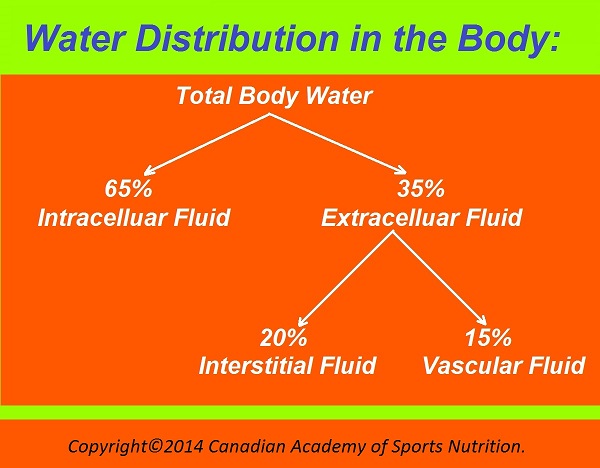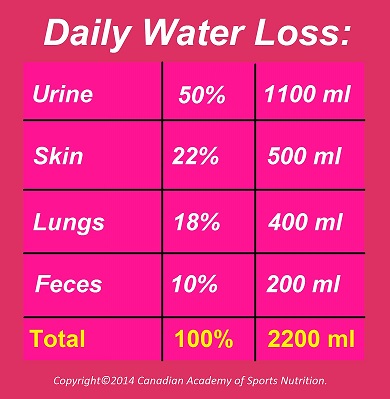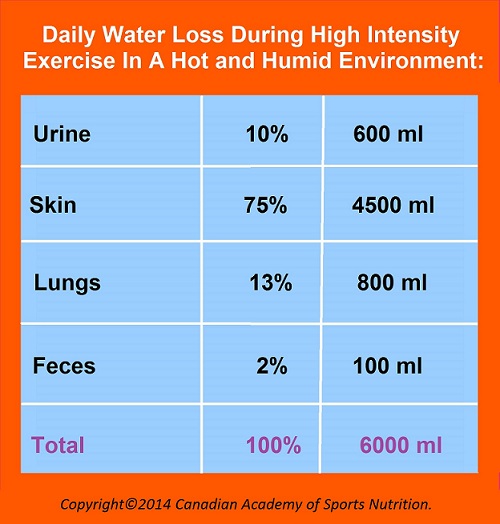Water is the most vital compound for any living organisms. It constitutes up to 70% of the body weight, depending on age, gender, and body composition. Water is the main component of all fluids in the body and involves almost in every functions of the body.
For the body composition of an average person, see the table below.
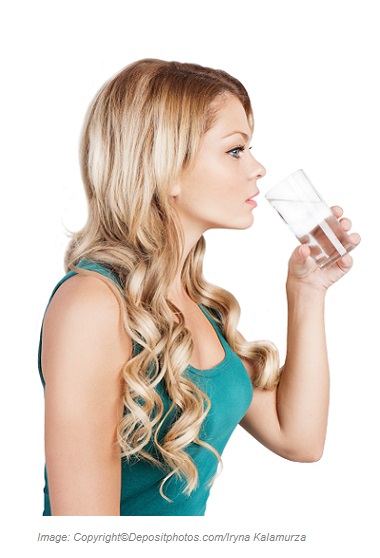
Body Composition:
Water | 60% |
Proteins | 18% |
Fats | 15% |
Minerals | 4% |
Carbohydrates | 2% |
Vitamins | 1% |
Water Distribution:
The body contains two fluid compartments: intracellular (fluid inside the cells) and extracellular(fluid outside the cells). Extracellular fluid includes interstitial fluid (the fluid within the spaces between cells, lymph, saliva, fluid in the eyes and joints, fluid secreted by the glands and digestive system) andvascular fluid (blood plasma).
Of the total body water, about 65% makes up intracellular water, and about 35% represents extracellular water. Vascular fluid accounts for approximately 15% of the extracellular fluid. A normal vascular volume is about 4 – 5 liters.
Water Loss:
An average person with little or no exercise loses about 2200 ml (2.2 L) of water daily. For the daily water loss, see the table below.
Water Requirements:
The three sources of water are liquids, foods, and metabolic water. Milk and juices contain considerable water, but they do not count as the same volume of water. Not only do not alcoholic beverages and caffeine – containing drinks such as coffee, tea, and sodas count as water, but also they require an increase in water intake, because they act as diuretics.
As a rule of thumb, for every 60 mg of caffeine you consume, you would need an extra glass of water. As a result, if you have a cup of tea or coffee, you would need to add one or two glasses of water to your normal daily intake.
Foods especially fruits and vegetables contain substantial amounts of water. For water contents of fruits and vegetables, click on the links below:
Several factors affect daily water intake. They include size of the body, activity level, diets, environmental temperature, and health conditions such as fever, diarrhea, and kidney diseases. Even though an average person loses 2.2 L of water daily, he requires only 2 L of water daily, as the body produces about 200 ml of water daily. It is called “metabolic water”, which comes from the catabolism of macronutrients and chemical reactions taken place in the body.
A simple formula to calculate your daily water intake is 1 glass (250 ml) for every 16 Ibs of your body weight. For example, if you are 145 Ibs, you would need 9 glasses (145 divide by 16) daily.
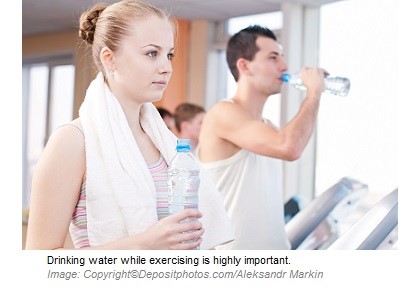
Dynamics of Water During Exercise:

The ratios of water in different compartments of the body change during exercise. The percentage of water in intracellular compartment increases as more water shifts to the working muscles. Besides, there is a fluid shift from vascular compartment to interacellular and interstitial compartments.
To maintain water balance in the body during exercise, it is highly important to drink sufficient amounts of water before, during, and after exercise. Water loss increases during exercise. The loss of body water during exercise largely occurs through the skin and lungs, which is called “insensible loss”.
Insensible water loss during exercise is determined by the intensity of exercise, humidity, and temperature of the environment. To evaluate water loss during exercise, a simple way is to monitor any changes in body weight. One pound loss of body weight represents the loss of about 500 ml of water.
Daily water loss during a high intensity exercise in a hot and humid environment is about 6 L (see the table below).
For the amount of water you are required to drink before, during, and after exercise, see “Sports Nutrition”.

